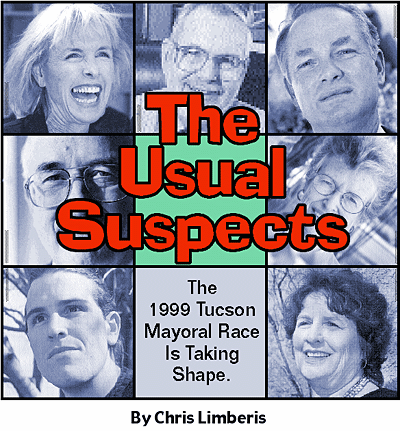
ON A RUN-OF-THE-MILL DAY in 1989, playwright and actress Molly
McKasson spun in front of the Democratic old guard at the Plaza
International Hotel on East Speedway.
Literally.
McKasson spun around three times that day as she told the story
of an Indian who lost the desert to some desecration each time
he turned to survey the land he loved.
 If they weren't snickering, those attending this Democrats of
Greater Tucson luncheon were rolling their eyes. Certainly Sharon
Hekman, the heavily favored and appointed City Council member
McKasson was challenging in the Democratic primary for the central
Ward 6 seat, was unimpressed.
If they weren't snickering, those attending this Democrats of
Greater Tucson luncheon were rolling their eyes. Certainly Sharon
Hekman, the heavily favored and appointed City Council member
McKasson was challenging in the Democratic primary for the central
Ward 6 seat, was unimpressed.
That changed. Complacency wore off for Hekman, chosen in 1987
to fill the term of Tom Volgy when he left the Council to run
for, and win, the mayor's seat. Soon Hekman's handlers put out
the distress signals. They tried to enlist some political toughs
to see what could be done to stop McKasson, but it was too late.
McKasson clobbered Hekman, returning her to the bureaucracy of
the Pima County Attorney's Office while also adding her to the
list of women--which at the time included every female council
member--who could not retain a City Council seat through election.
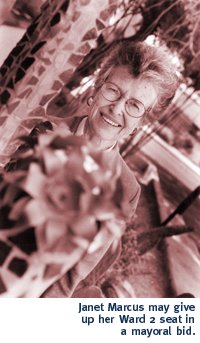 And after 14 months out of office, a period McKasson used to
collaborate with former aide Dave Devine on articles about city
issues for the Tucson Weekly and other rags, McKasson returned
to an announcement stage.
And after 14 months out of office, a period McKasson used to
collaborate with former aide Dave Devine on articles about city
issues for the Tucson Weekly and other rags, McKasson returned
to an announcement stage.
This time, outside City Hall on February 10--a rare cold day--McKasson
confirmed a poorly kept secret: She's running for mayor.
In a black suit, the tall and slightly hoarse McKasson did not
have some Indian gimmick to kick off this campaign. Buttressed
by family and about 40 friends and supporters, McKasson was forceful
and direct in her short address as the wind whipped around the
east side of City Hall.
Toughened by eight years of sometimes bruising, never-ending
battles on the City Council, McKasson's only tentativeness for
her mayoral announcement was a question about stage direction
ordered by friend and aide Carolyn Campbell:
"Everybody behind me?" McKasson asked, as she also
fretted, "Oh, I have dog hair all over me. I don't? Some
in front. Yes. This is good. Okay. So are we about ready?
"Hello everybody. Thank you for being here. It's the winds
of change," McKasson said in her welcome that was as informal,
and upbeat, as a family celebration. "I want to start off
by making my first campaign pledge. I want to pledge to you that
I am going to keep my remarks short and to the point. Those of
you who know me, most of you do, know this is a new Molly. The
new Molly for mayor."
Awash in energy, McKasson gave a bit of a cheerleading admonition
reminicent of New York Mayor Rudy Giuliani's "It can be done
and it will be done" inaugural speech after his 1993 election.
"The story of our community is about the greatness of its
people. Their courage, the diversity, the love of community and
environment, their commitment to peace and justice (and) creativity
and hard work," she said. "I love this place. I love
the people who live here.
"That's why I do not accept that our air and water quality
is getting worse. I refuse to believe that the growing violence
and working poverty are inevitable declines in our quality of
life. That can't be, not where I grew up.
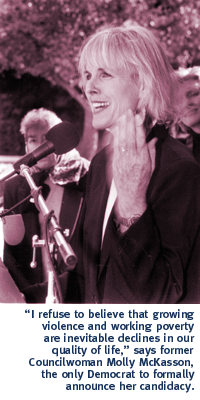 "We're a great people," McKasson said. "We can
do better. Forget the naysayers. Yes we can. And we must."
"We're a great people," McKasson said. "We can
do better. Forget the naysayers. Yes we can. And we must."
From there, McKasson, 51, gave a further look at the New Molly.
It was a look, clipped and economical, that was afforded by a
different view. One from the Sam Hughes bungalow on a calm, family-oriented
East Fourth Street block where McKasson, a Northwestern University
graduate, and her carpenter husband rear their family.
"The people in Tucson do not care about a new City Hall,"
she declared. "The people in Tucson care about more beat
patrol officers and safety, about open space and pocket parks,
about lights and sidewalks, street improvements and the safety
of their children, drainage problems. Oh, these aren't glamorous.
But these are real issues for real people. Let's re-prioritize
our spending."
Residents, McKasson said, are fed up with the city's fights with
other jurisdictions--Pima County, and the teetering communities
of Tortolita and Casas Adobes.
"They want us to do everything we can to help create more
economic opportunity and job training. Working poverty is killing
us," McKasson said. "I'll take a leadership role to
bring the appropriate people together to eliminate the shame of
working poverty and put us on the map as a center for great jobs
involved with new technology, ingenuity and creativity."
The themes--the Council's skewed priorities and taxpayers' surfeit
of City Hall debate and inertia--ran throughout.
"No one can bear to read about another murder in the morning
paper. They don't want to hear us arguing about peddlers on the
medians. They want leadership to stop the escalating violence,
especially with our youth...we need to pay our beat cops more
so we can keep them on the beat," McKasson said. "And
we need to keep our neighborhoods strong. We need to focus on
prevention, reach out and help at-risk families when their children
are young...join hands with people all over town and pledge to
be a community that puts an end to child abuse. People say it
can't be done. I say yes we can and we must."
And then to the McKasson bedrock: Central Arizona Project water.
"The community doesn't want to hear politicians fighting
about what to do with the CAP," she said. "They want
us to use it and they don't want to drink it. Why should a new
golf course guzzle drinking water while people get canal water...I
will honor the people's vote and push hard to get our CAP allotment
moved down the pipeline to farms, mines and golf courses."
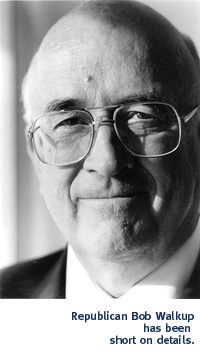 McKasson briskly wrapped it up with pledges to adhere to city
commissions and committees, to listen to residents, and to be
a leader. The media had but a few questions. McKasson flatly disagreed
with the city's costly fight to block Tortolita and Casas Adobes
incorporations and applauded a slim council majority's controversial
decision to close the three northern entrances to El Con Mall.
McKasson briskly wrapped it up with pledges to adhere to city
commissions and committees, to listen to residents, and to be
a leader. The media had but a few questions. McKasson flatly disagreed
with the city's costly fight to block Tortolita and Casas Adobes
incorporations and applauded a slim council majority's controversial
decision to close the three northern entrances to El Con Mall.
Afterward, she wanted a smoke.
SHIELDED FROM THAT cold wind and McKasson's assertiveness
that day was Raul Grijalva, the three-term Democratic county supervisor
who yearned to be mayor. He still yearns, even though he would
have to take a pay cut--from his supervisor's salary of $52,000
a year to the mayoral salary of $36,000. Three weeks after McKasson's
announcement, Grijalva finally announced he wouldn't be in the
fight.
Also out of the cold, but just as uncomfortable as Grijalva,
was Mayor George Miller, the Democrat who has repeatedly said
he will not announce until early next month whether he'll seek
a third term. With her mix of perceived political goofiness and
absolute tenacity, McKasson gave Miller fits that culminated with
his nasty, costly, and ultimately successful fight to throw her
out of the Ward 6 office alongside his on the top floor of City
Hall.
Besides consulting with his wife/adviser Roslyn Miller, the 76-year-old
Mayor has been busy finding a suitable Democratic candidate to
thwart McKasson in the primary, should he choose not to run. He
chatted with Grijalva, but was unhappy that he couldn't get assurances
from Grijalva on a couple of issues, including water.
That leaves Miller with his ally, Janet Marcus, the three-term
Democratic council member who has ridden Miller's coattails and
the heavy, city-wide Democratic voter-registration advantage,
to win re-election in 1991 and 1995 despite trailing inside her
northeast side Ward 2.
And Miller has another friend in the lineup, Republican Robert
Elwyn Walkup, the former Hughes Missile Systems Co. executive
who announced his campaign for mayor a couple of days before McKasson.
Walkup gave Miller $120 in the 1995 campaign.
Walkup, an engaging and pleasant Iowa native, left Hughes in
1996 and is president of Winning Pathways, a software company
he helped start in 1997.
He and Miller developed their relationship during Walkup's years
as the chairman of GTEC, the government-funded business recruiting
group assembled in 1988 by then-Mayor Tom Volgy in the wake of
the IBM pullout.
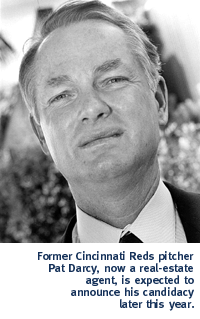 After his kickoff announcement, Walkup said that while he remained
cordial with Miller, he'll run even if Miller seeks a third term.
After his kickoff announcement, Walkup said that while he remained
cordial with Miller, he'll run even if Miller seeks a third term.
"It's time for a change," said the 62-year-old Walkup.
Walkup's announcement was carefully choreographed. Many of the
50 to 60 people there were Republican precinct officials summoned
by a machine's recorded message.
Walkup was pleased to have big names, supposed or real, with
signs that they raised with a "Yeah!" on cue. Among
his officials are former two-term Republican Supervisor Katie
Dusenberry; former city Parks and Recreation Director Jim Ronstadt;
Republican Councilman Fred Ronstadt (Jim's son) and his staff;
second-generation political insider Ted Abrams; restaurateur Frank
Davis; beer and beverage distributor Dorothy Finley; and Hispanic
Democrats Ernesto Portillo and John Huerta.
Publicist Steve Lynn, who sucked up money in Lee Davis' surprising
loss in the Republican District 4 Board of Supervisors race in
1992, proudly stood off to the side.
After telling the story of Maria, a girl who climbed a rock wall
at a childrens' event, Walkup listed "the four toughest issues
in Tucson."
A sample:
"The environment. We know that the environment and growth
can live in harmony. Let us preserve our open spaces. Let's plan
how we grow. And let's solve our water problem now. Our people
are demanding--and we should guarantee them--clean, safe, abundant
and affordable water. As mayor, I will bring the best people and
facts to the table. Together, by the end of my term we will have
in place the solution to our water problems that provides the
best for the city and the people. Together we can get this done."
Walkup's crowd gave one of its "Yeah, Bob!" salutes
as he continued with his carefully drafted, say-little speech.
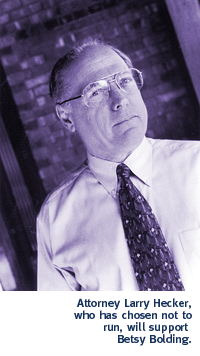 "Each day," Walkup complained, "I see, because
I'm there, cars, buses and bikes that have to sit through three
lights at the Grant and Campbell intersection. It hurts our environment,
it wastes energy and it makes no sense. And every year, our tax
dollars get sucked up to Phoenix and never come back. As mayor,
I will work to get our fair share of federal and state transportation
funds from the Republican-dominated state Legislature."
"Each day," Walkup complained, "I see, because
I'm there, cars, buses and bikes that have to sit through three
lights at the Grant and Campbell intersection. It hurts our environment,
it wastes energy and it makes no sense. And every year, our tax
dollars get sucked up to Phoenix and never come back. As mayor,
I will work to get our fair share of federal and state transportation
funds from the Republican-dominated state Legislature."
Walkup then proclaimed, "We need quality jobs. As mayor,
I'll do all that I can to ensure a livable wage for all of Tucson's
working families. The key is retaining and expanding the jobs
that we already have here in Tucson, and doing a better job of
recruiting new opportunities into our community. I know how to
do that because I've been doing that for a long time. Let's educate
our workforce so they're ready for new opportunities when they
arise. As mayor I will build the partnerships to expand, retain
and recruit jobs into this community. We can all work together
to do this."
Walkup also implored Tucson to "work together to do this"
on programs for youth. "We must be willing to invest in our
youth," he said. "Let's work together and make sure
they grow up healthy and safe and in friendly neighborhoods. Let's
educate and train our children so they can get good jobs when
they graduate. And let's make sure there are good jobs available.
We're losing way too many of our young people to other places."
Since his announcement, Walkup has canceled two interviews with
The Weekly. His campaign staff said last week he was too
busy for a conversation in the foreseeable future. Staffers also
said he wasn't making public appearances because he was too busy
meeting with people behind closed doors. He did take time for
a cocktail reception for GOP precinct committee reps on March
5 at the Marriott University Park.
There's also a tad more about Bob on his short-on-the-details
website. Here, browsers can read that Bob Walkup "has integrity
and is honest"--reassuring qualities for any candidate.
Walkup wants to be the first Republican mayor since Lew Murphy,
who retired after four terms in 1987.
WALKUP, WHOSE CARDBOARD, stage-prop announcement in a sunny
El Presidio Park showed some business and establishment links,
is the lone Republican so far. But there's plenty of time, both
for real candidates and more trial balloons, before nominating
petitions are due June 24. The city's primary election is set
for September 7 .
The latest Democrat to join the race is Betsy Bolding, a former
high-school journalism teacher, former Tucson aide to Bruce Babbitt
when he was governor of Arizona, and director of consumer affairs
for Tucson Electric Power for the last eight years. Bolding announced
her candidacy earlier this week.
Others on the Democratic list include Pat Darcy, the former Cincinnati
Reds pitcher and agent for CB Richard Ellis Commercial Real Estate;
Emily Machala, a retired teacher who has run low-key, no-money
campaigns for city office several times; and Paul Wallace, a bus
driver who has never sought public office. Ed Kahn, a lawyer and
frequent, if unsuccessful, candidate for public office has said
he'll carry the Libertarian banner as he did four years ago, while
newcomer Mike Fleishman, 26, is mounting a mayoral run for the
Reform Party (see "Third And Long Shots," page 19).
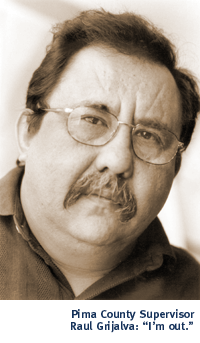 Big names have already bowed out. Among them, Larry Hecker, a
well-liked lawyer who represents clients before both the Board
of Supervisors and City Council. Hecker, like Bolding, comes from
the Babbitt circle--he served as Babbitt's chief of staff--and
was close to running for mayor in 1983. That's the year that Clinton
White House aide and Tucson High graduate Fred Duval hung out
in Hecker's office ostensibly to study for the bar exam. Politics,
as it always has, overswept Duval, and he and his friends, including
consultant Jan Lesher, prepped Hecker for a campaign. The "Heck
Yes!" bumper stickers they would have used to try to oust
Republican Lew Murphy are in a box somewhere.
Big names have already bowed out. Among them, Larry Hecker, a
well-liked lawyer who represents clients before both the Board
of Supervisors and City Council. Hecker, like Bolding, comes from
the Babbitt circle--he served as Babbitt's chief of staff--and
was close to running for mayor in 1983. That's the year that Clinton
White House aide and Tucson High graduate Fred Duval hung out
in Hecker's office ostensibly to study for the bar exam. Politics,
as it always has, overswept Duval, and he and his friends, including
consultant Jan Lesher, prepped Hecker for a campaign. The "Heck
Yes!" bumper stickers they would have used to try to oust
Republican Lew Murphy are in a box somewhere.
Polished and candid, Hecker has impressive credentials. Besides
his service to Babbitt, which he admits was not always smooth,
Hecker also has served on the state Transportation Board and the
Board of Medical Examiners. Like Walkup, Hecker was chairman of
the Greater Tucson Economic Council. He was effective despite
suffering the poor, arrogant administration of GTEC's former self-serving
director, Andy Flores. Hecker also was a key figure in getting
the state to adopt a holiday honoring the late Martin Luther King,
Jr. and in drafting and lobbying for hate-crime ordinances. Hecker,
51, says he wants to continue spending more time with his family
as well as concentrating on his law practice.
Also out of the mayoral race is Steve Leal, the bright, pragmatic
Democratic council member from southside Ward 5. Leal, 51, is
now in his third term and has straightened out a number of messes
left by Republican Roy Laos. He has managed to balance business
and neighborhood issues effectively. Family is also the key concern
keeping Leal from this year's mayoral race.
Some old-line politicos floated Jim Murphy's name early this
year. A Democrat, Murphy served on the City Council before moving
to the Board of Supervisors, where he gave up his seat in 1975
to then-state Sen. Sam Lena to take a job as an assistant county
manager. Despite the lack of relevant education, Murphy held several
top county positions, mostly overseeing the healthcare system.
After some years embroiled in controversy, he was seen as a stabilizing
force for the county's healthcare system from 1993 through 1995,
when the Board of Supervisors' Republican majority led by Ed Moore
wanted to gut the system. Murphy, 62, has a lot of friends and
a lot of favors still out. But he's since told his nostalgic backers
that he enjoys being out of the limelight and off the firing line.
WITH A POSSIBLE Democratic primary of McKasson, Marcus,
Bolding and Machala, Grijalva is chafing at opportunities lost.
It was little comfort then, two days after he told the dailies
that he'd stay put, that several county employees approached Grijalva
as he sat smoking in the county's subterranean cafeteria to tell
him what a good mayor he would have been and that it was too bad
he wasn't running.
He may be trapped now by his own success. Aside from one crowded
race in his three terms on the Tucson Unified School District
Board, Grijalva, 51, has never faced a serious election challenge.
His fear of losing has grown. He averted the one tough fight,
in 1992, by having allies go to court to knock Luis Gonzales off
the ballot for fraudulent petition signatures. Then he and Democrat
Dan Eckstrom battled Moore's majority to save the county health
system that now lies buried under nearly $40 million in debt.
He led the effort for the county's record-setting $370 million
bond election in 1997, but the county now lacks the money to open,
operate and maintain the facilities voters said they were willing
to go into debt to build.
Grijalva watched McKasson and her band of supporters from the
height of the county executive offices overlooking El Presidio
Park. He laughed and made jokes. But he also bitched, particularly
at the condescending notion from some of McKasson's Sam Hughes,
West University and Tucson Mountain supporters that Grijalva had
best stay where he is.
Those are the same people Grijalva and his crew brought together
with other friends--and enemies--in an unlikely alliance that
fueled public opinion to kill the Canoa Ranch development plan
south of Green Valley in January. Grijalva's momentum from that
huge victory didn't take long to evaporate.
"I'm out," Grijalva told The Weekly. "No
more analysis. Leave me out."
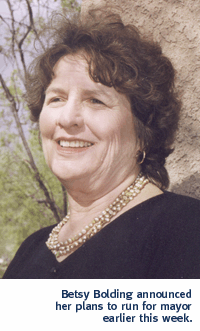 In the vacuum, McKasson has Bolding, Marcus, Darcy and, to a
lesser extent, Machala. Machala, 51, is not much of a threat.
A pleasant woman who lives up the street from McKasson, Machala
kicked off her moneyless campaign in 1991 by appearing at the
City Council's call to the audience with a big hat which, she
cheerfully told the council, she was tossing into the ring.
In the vacuum, McKasson has Bolding, Marcus, Darcy and, to a
lesser extent, Machala. Machala, 51, is not much of a threat.
A pleasant woman who lives up the street from McKasson, Machala
kicked off her moneyless campaign in 1991 by appearing at the
City Council's call to the audience with a big hat which, she
cheerfully told the council, she was tossing into the ring.
Darcy, a graduate of Rincon High School, is a rare find--affable
and humble despite working in commercial real estate in Tucson
and despite being a member of Cincinnati's Big Red Machine. (Yes,
it was Darcy who delivered the pitch that Carlton Fisk hit out
of Fenway in the memorable Game Six of the 1975 World Series.
But Darcy has the ring; the Reds prevailed in Game Seven.) With
common sense and without phony cheerleading, Darcy, 48, served
on the city's baseball committee in the early 1990s. But if he
hopes to make political headway, he'll need to move off his persistent
gripe: that the county and city should have built the spring training
and AAA baseball complex downtown, rather than at the southside
Kino Veterans' Memorial Park.
Meanwhile, Bolding and Marcus are gearing up to keep McKasson
from the mayor's office. Representatives from both camps met last
week to--oddly--condone each other's campaign.
Bolding, 58, says she's often thought about running for office
and believes she can serve to reverse the polarization that she
says has driven many people from community involvement.
Although she's planning an announcement in early May, she's already
acting like a mayoral candidate. At a recent Tucson Urban League
dinner, she chatted up everyone, going from table to table.
Marcus, 63, is fond of saying that through politics she has developed
the hide of a rhinoceros.
That may explain why Marcus remained aloof during her first term
when the dailies revealed that she and her family enjoyed water
from a well and a lake in the backyard of her East Glenn Street
home. Conservationists took it a little harder because Marcus
and the Council had embarked, during a dry early summer in 1990,
on a city-wide water conservation plan. The disclosure also came
as Tanque Verde Valley residents complained that overpumping by
the city depleted their water table and killed cottonwood groves.
Marcus, who then headed the Council's environmental subcommittee,
angered businesses--particularly the popular, locally owned eegee's--in
her pursuit of the foam cup ban. Critics said her efforts were
particularly hypocritical in light of the big chunk of Exxon stock
she held even after the Exxon Valdez wreck 10 years ago dumped
11 million gallons of oil into Alaska's Prince William Sound.
Exxon no longer appears on Marcus' financial disclosure.
Like Grijalva, Marcus would prefer to employ all means to avoid
an election fight. She sued to keep stockbroker Carl Bedford from
the primary ballot in 1991.
Former Marcus aide Carol West has pulled a packet in preparation
for a Democratic run in Ward 2, where Republican Rick Grinnell
has announced a second bid. Besides Ward 2, the seats in westside
Ward 1 and southeast side Ward 4 are up. Incumbent Democrats José
Ibarra, in Ward 1, and Shirley Scott, in Ward 4, so far have no
announced opposition.
MILLER HAD AN easy time four years ago getting 53 percent
of the vote, against the 34 percent for Republican Sharon Collins,
now an aide to Gov. Jane Dee Hull, and Kahn's 9 percent. In 1991,
Miller struggled to a plurality with 47 percent of the vote, to
Republican George Borozan's 38 percent and Libertarian Gay Lynn
Goetzke's nearly 11 percent. Turnout in 1995 plummeted by more
than 5 percentage points from the 1991 level of 32.89 percent.
Candidates again will be in taxpayers' pocketbooks:
Mayoral candidates who collect 300 contributions of $10 or more
qualify for matching funds from the city--up to $75,085. Candidates
can spend no more than $150,170 this year. Council candidates,
who are limited to $75,085 in expenses if they sign on for matching
funds, can receive up to $37,542 in city money.
At any rate, as things stand now, it's shaping up to be a three-way
general election, possibly with a fourth from Fleishman's Reform
candidacy, just as it has been for the last two elections.

|





